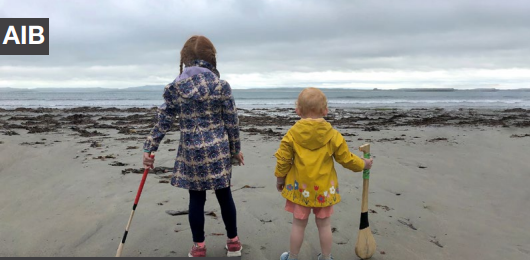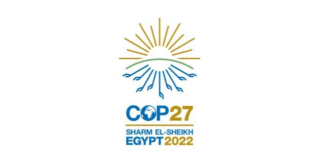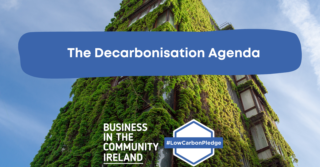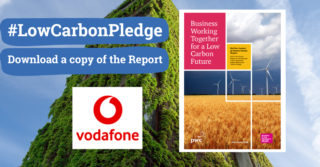Decarbonising service offerings with AIB
The financial services sector has a significant role to play in meeting global and national climate and wider sustainability targets. As the majority of the emissions in this sector are located in their investment portfolios,
companies will need to look at how they can decarbonise these portfolios and service offerings. AIB is one of the largest banks in Ireland and here it shares its journey to setting ambitious climate targets aligned to science-based targets (SBTs) and how it plans to deliver on its wider sustainability ambitions.
Last year, AIB became the first Irish bank to commit to becoming carbon neutral in its own operations by
2030. That “net-zero” commitment was significant, and the bank is making good progress to achieve this target. However, in order to maximise the impact it can have on wider societal decarbonisation, financial institutions must look beyond their own operations.The greatest impact AIB can have on the global carbon footprint is by supporting all customer groupsin their transition to a low carbon economy. To do this, AIB has developed a range of green finance related products and propositions, including green mortgages, green consumer loans, an electric vehicle
proposition, and sustainability-linked loans. AIB also has a dedicated team focussed on financing renewable energy and other infrastructure to support the transition to a net-zero economy. In addition, AIB is greening its funding model and last year became the first Irish bank to issue a green bond. In May, the bank raised a further €750 million when it issued its second green bond bringing to €1.75billion raised from green bonds in less than a year. A main challenge across the industry is to define what is considered “green” and “transition” lending within a bank’s lending portfolio and AIB is continuing to develop appropriate frameworks and standards to overcome this challenge.
Having already established its scope 1 and 2 baseline, AIB has also completed an initial sector level emissions assessment of its scope 3 loan book emissions. This is a critical first step in determining the scale of the challenge on a sector by sector basis and forms the baseline dataset. AIB’s ambition is that 70% of its new lending will be “green” or “transition” by 2030 and that the whole loan book will achieve net-zero by 2040 (with the exception of agriculture which will follow the government’s trajectory of 2050).
AIB’s key piece of advice is that a clear tone from the top is critically important. Tackling climate change is not easy. There will be many hurdles and challenges on the journey to net-zero and so it is vital that everybody across the whole organisation understands the importance and the urgency of this agenda and how it aligns with the corporate strategy. Another key message is the importance of accelerating the capture and reporting of related emissions data and integrating this into lending and management information systems. AIB ensures that its sector plans are developed over the short (3 year) and longer term (10 year) horizons to ensure they are not too narrow when considering future policy and regulations.
The trajectory from baseline to targets and tracking of progress allows the lending teams to plan and customise specific propositions to drive the business on the appropriate low carbon path. Critical to this is setting ambitious, but also commercially realistic targets, in the short, medium and long-term.
As the Science Based Targets initiative (SBTi) guidance for Financial Institutions (FIs) is quite new and still undergoing development, FIs face a number of challenges. It can be difficult to have the required emissions data at an individual property, counterparty and customer level in order to set accurate targets in which the organisation can have confidence. It has been challenging to translate the climate science and technical SBTi guidance into language and concepts that the business, and ultimately the customer, can practically engage with. The specific SBT assessment tool must be relevant for the specific circumstances (both in terms of national/regional basis and with respect to the sectoral coverage within the FI) and loan book of each bank. It is all about finding the right balance between targets that are stretching and ambitious for the lending institution but that are also viable in terms of bringing customers on that journey to a decarbonisation pathway that is consistent with the Paris Agreement and our national targets.
The role of the financial sector in meeting global and national sustainability targets
The financial services sector plays a central role in the green transition which is why AIB is so invested in the issue of climate change. Partnerships are critical to build a “coalition” of the willing. For residential customers this partnership is based on the availability of green products that align with the most material consumer buying decisions which are typically house or car purchases. AIB engages with its business customers to understand the challenges they face in their particular sectors (e.g. via industry groups, meetings, round tables and other events). The bank also regularly reviews the external environment and engages with key stakeholders to ensure they are aware of the latest policy and regulatory developments in the sector. AIB believes it is also important to support the communities in which it operates. For example, AIB partners with FoodCloud to help match surplus food with charities and community groups that need it most. AIB believes that education and awareness is critically important in reaching climate targets and central to its role in this space is its annual sustainability conference which is attended by thousands of stakeholders from all key public and private sector groups. AIB’s credentials as a leader in sustainability are also recognised by key Environmental Social and Governance (ESG) ratings agencies and the Carbon Disclosure Project (CDP) where AIB has achieved leadership rating for the last five years – the only bank in Ireland and the UK to feature on the Global A list for 2020.
Download a copy of the full Low Carbon Pledge report.
Find out more about the Low Carbon Pledge.







